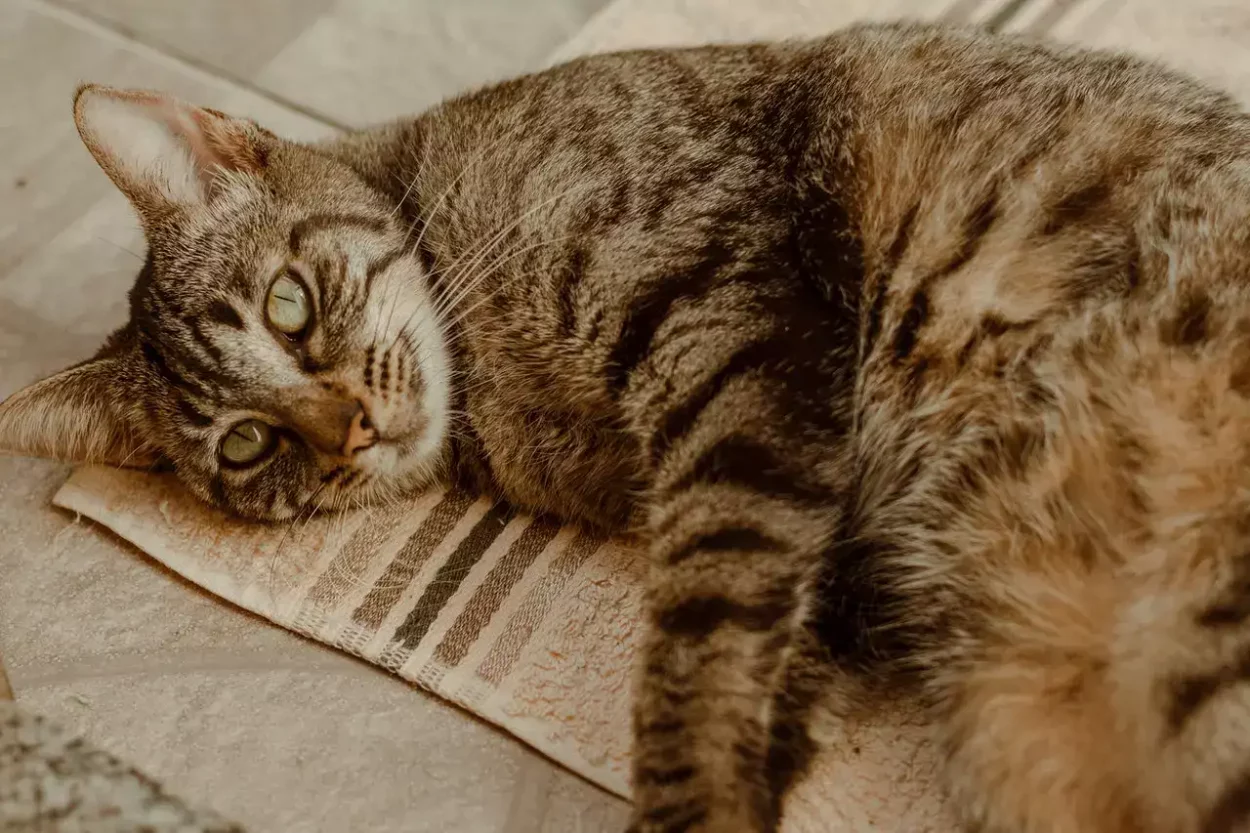In addition to the disgusting odor, a cat smelling like fish can indicate medical issues that need attention. We look at all of the possibilities and treatments.
You may be asking yourself, “Why does my cat smell like fish?”
If your cat is emitting a fishy odor, it could be due to a various infections or diseases, or even because they recently consumed a fishy snack or fish oil supplement capsule. However, any worrisome smells mean that it may be time to consult with a veterinarian.
The most common reason for a fishy scent, however, is anal gland secretions.
The Reason Your Cat Smells Like Fish
Anal gland secretions typically emit a fishy odor because they are filled with an assemblage of sweat glands that can produce undesirable scents. The anal sacs are located near your cat’s anus and act as a scent marker when your cat defecates.
A strange smell can also emanate from your cat’s anal glands if they become scared or nervous. Most of the time, anal glands give off a fish-like scent. So, if your cat is smelling like they took a recent romp along a fish-lined beach, you may want to inspect their anal glands. They may be impacted and need secreting.
What Are Anal Glands?
More specifically, anal glands serve the purpose of marking territory to warn away predators. Due to domestication, many cats need their anal glands expressed by a veterinarian because they cannot release naturally.
The anal glands are located between the internal and external sphincters, which are muscles that help your cathold feces in the rectum until it’s time to pass. There are two openings located on either side of the cat’s anus, which is where they are emptied. As the stool passes through the rectum, the muscles squeeze the anal sacs, which release their contents on the stool.
If the anal sacs are not released, they can become too full, and their thick liquid can clog the sacs’ opening. This affliction can lead to discomfort, and at times, infection or abscess.
Anal Sac Disease Causes
When anal sac issues cause a fishy smell on your cat , simple impaction is the most common issue. But anal sac problems can also be the result of an infection, abscess, or even cancer. It’s important to take your cat in for a check-up if the condition gets worse.
Impaction
Impaction is when your cat’s anal sacs contents are not properly expelled. Anal sacs that are visibly swollen or warm to the touch are often impacted and must be released. Impactions can occur if your cat has a soft stool that is not firm enough to release the anal sacs during the defecation process. There may also be an abnormality in the sacs that make release difficult.
Infection and/or Abscess
If the fluid buildup has led to infection and abscess, bleeding or anal drainage will appear, which might be evidence of a rupture. Of course, a fishy smell is also a vital indication. These types of infections are typically excruciating for your cat and should be treated immediately.
Tumor
An anal sac tumor is evident if your cat’s anal sacs are firm and enlarged. The tumor typically prevents any expression; thus, a vet will need to identify and treat the tumor.
Symptoms
If a cat cannot release their over-filled anal sacs, they will typically scoot along the floor in a seated position to attempt to empty the sacs. The buildup will normally cause itchiness, irritation, and inflammation.
Additionally, a cat may start to bite, lick, or scratch its rear end. Other indicators include a cat that holds its tail between its legs or seems to walk uncomfortably.
How to Get Rid of My Cat’s Fishy Smell From Anal Glands
There are a few options for how to get rid of a fishy smell from a cat. If your cat’s anal glands suffer from impaction or infection, it’s essential to visit a vet or groomer. Trained professionals will massage the glands to release their contents.
If anal gland impaction is a chronic condition in your cat, you can learn to express their anal glands yourself. Have your vet teach you how to do it properly. It’s usually quite simple, and if there are no other complications like infection, etc., you can save yourself trips to the vet or groomer by doing it yourself.
For cats suffering from an abscess, veterinarians will usually prescribe pain medication and antibiotics. Anal sac abscess may also require surgery in extreme cases.
If a veterinarian has identified cancer as the cause of the disease, your cat may have to undergo chemotherapy, surgery, or radiation therapy to treat it, depending on the type of cancer.
Preventing Anal Sac Disease
While it’s challenging to prevent anal sac disease, a high-fiber diet will naturally help your cat express their anal sacs. Overweight cats are more prone to anal sac disease as well, so it’s essential to keep your cat on a regular exercise routine.
Additionally, it’s essential to keep an eye on your cat’s stool to identify any blood or pus that may indicate anal sac disease.
Cats Vulnerable to Anal Sac Disease
Typically, large breed cats rarely experience issues concerning anal sac disease. Impactions are more common in small breed cats.
Furthermore, older cats or cats who are obese have a higher probability of suffering from anal sac disease.
Other Reasons Your Cat May Smell Like Fish
While anal sac disease is the most common reason for your cat’s fishy smell, additional ailments should also be considered.
Urinary Tract Infection
A Urinary Tract Infection (UTI), which is common in diabetic cats, can also cause a smelly, fish-like odor. In this case, the cat’s diluted urine facilitates more bacterial growth. If left untreated, UTIs can travel through the urinary tract and infect the kidneys, which can be extremely dangerous to your cat.
Read our comprehensive look at cat UTIs, including symptoms and treatments.
Pyometra
Pyometra, the infection of the uterus of non-spayed cats, is another potential cause. It typically occurs in middle-aged female cats and develops as a result of hormonal changes. Elevated progesterone levels can cause the uterine lining to thicken and secrete fluids, which optimizes the environment for bacteria growth, infection, and fishy odors.
Symptoms of Pyometra include fatigue and depression. Cats may also stop eating and show an extended abdomen that’s painful to the touch. Pyometra can also lead to kidney infections, so if your cat is drinking or urinating more often than usual, their body may be trying to expel harmful bacteria from their kidneys.
In this case, take your cat to the veterinarian immediately, as there’s a risk of sepsis. Removing the cat’s uterus will require surgery. To prevent Pyometra, it’s essential to spay your cat.
Fungal Disease
Fungal disease may also be affecting your cat: Yeast infections typically occur when a cat is exposed to fungal soil and breathes in the fungal spores.
The spores can spread throughout the bloodstream and lymphatic muscles to cause a lack of appetite, weight loss, breathing problems, eye disease, or skin sores. Call your vet immediately to schedule antifungal treatments if these issues persist for your cat.
Periodontal Disease
If your cat’s mouth smells fishy, they may be suffering from kidney disease, diabetes, or periodontal disease due to gum inflammation or infection, which is common in most cats. To prevent this type of oral disease, brush your cat’s teeth with enzymatic toothpaste two to three times a week to avoid the formation of plague.
If your cat is resistant to brushing, maintaining a healthy diet for your cat may help prevent harmful buildup or provide your cat with specialized treats for chewing, which prevents the buildup of tartar.
Gastrointestinal Disorder
Gastrointestinal disorders typically arise if your cat suffers from any type of food allergy. Symptoms include excessive burping or trouble digesting their food.
Your cat may also regurgitate their food, drool, or attempt to gulp air. Veterinarians will typically prescribe antacid medications to combat the symptoms. There are also a number of home remedies for your cat’s upset stomach.
Other Causes
Less extreme causes include your cat’s diet or environment. A cat who smells like fish may have recently ingested fish oil, a supplement that aids your cat’s diet, prevents itchiness, relieves joint pain, and improves fur health. Furthermore, your cat may smell like fish if they recently rolled in something odorous.
Final Thoughts
There are several possible reasons that your cat smells like fish, and many of them require medical attention. So don’t ignore the issue if you don’t know the source of the fish smell.




Leave a Comment